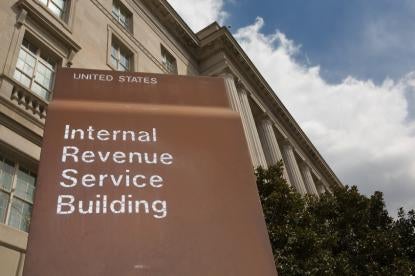Congress enacts a new notification requirement, codifies the gift tax exemption, and blocks political activity regulations for section 501(c)(4) organizations.
On December 18, 2015, the US Congress enacted legislation that (1) requires social welfare organizations to notify the Internal Revenue Service (IRS) of their intent to operate under section 501(c)(4) shortly after they are formed, (2) confirms that contributions to section 501(c)(4) organizations are exempt from gift tax, and (3) prohibits the US Department of the Treasury (Treasury) from issuing any additional guidance for determining whether a section 501(c)(4) organization is organized and operated exclusively to promote social welfare.[1] Each of these provisions is discussed in more detail below.
501(c)(4) Organizations Can No Longer Self-Declare
Prior to the new legislation, social welfare organizations could self-declare tax-exempt status and were not required to notify the IRS of their existence until they filed an annual information return or notice (Form 990, 990-EZ, or 990-N). Under new section 506, social welfare organizations must notify the IRS within 60 days after formation that they are operating as a section 501(c)(4) organization. The legislation provides that section 501(c)(4) organizations that were established before the legislation was enacted and that have not already filed either a Form 1024 or a Form 990, 990-EZ, or 990-N have 180 days to file the notification. The IRS, however, recently issued Notice 2016-9 (the Notice), which extends these deadlines. The Notice states that the IRS plans to issue temporary regulations under the new section 506, and it advises organizations to wait until those regulations are issued before submitting the required notice information.
A notification under section 506 will need to include the following:
-
The organization’s name, address, and taxpayer identification number
-
The organization’s date of opening and the state of the organization
-
A statement of purpose for the organization
Separate from the new notice requirement, a section 501(c)(4) organization will still have the option to file an application to request that the IRS make a formal determination that it qualifies for tax-exempt status.[2]
Practical considerations:
-
Section 501(c)(4) organizations that filed Form 1024 and did not self-declare should confirm that they have a valid determination letter.
-
Self-declared section 501(c)(4) organizations that did not obtain a determination should make sure they have filed the requisite Form 990, 990-EZ, or 990-N.
-
Self-declared section 501(c)(4) organizations that have not filed the requisite Form 990, 990-EZ, or 990-N should do so and should also be prepared to notify the IRS that they intend to continue to operate under Section 501(c)(4) pursuant to the forthcoming notice requirements under section 506.
-
Newly formed section 501(c)(4) organizations should also be prepared to notify the IRS of their intent to operate under section 501(c)(4) pursuant to the forthcoming notice requirements under section 506.
Donations to 501(c)(4) Organizations Not Subject to Gift Tax
The new legislation confirms that gratuitous transfers to section 501(c)(4) organizations (as well as section 501(c)(5) and 501(c)(6) organizations) are exempt from the gift tax. Previously, codified exemptions from the gift tax applied only to gifts to section 501(c)(3) organizations and section 527 political organizations, leaving the application of the gift tax to social welfare organizations ambiguous.
Although the IRS rarely enforced the gift tax in the context of gratuitous transfers to social welfare organizations, it was difficult for taxpayers to obtain certainty about gifts to section 501(c)(4) organizations, which was particularly important for large gifts.
The issue began receiving congressional attention as the use of section 501(c)(4) organizations for political activity increased in the wake of the US Supreme Court’s 2010 Citizens United v. Federal Election Commission decision. In a 2011 memorandum, then Deputy Commissioner for Services and Enforcement Steve Miller directed that IRS examination resources should not be expended on enforcing the gift tax for gifts to section 501(c)(4) organizations.
The new legislation codified the IRS’s administrative practice, giving donors to social welfare organizations additional certainty that their contributions will not be subject to the gift tax.
Practical considerations:
-
Codifying the gift tax exclusion aligns the tax policy applicable to section 527 political organizations (including super PACs) with section 501(c)(4) organizations, which lends support to the view that section 501(c)(4) organizations may be used for political activity in addition to social welfare activity.
-
Exclusion of gifts to section 501(c)(4) organizations from gift tax also lends certainty to taxpayers who use these organizations for estate-planning purposes.
New 501(c)(4) Regulations and Guidance Delayed
Social welfare organizations have long wondered how much political activity they may undertake before they are no longer considered to “operate exclusively” for social welfare purposes. Under long-standing rules, organizations must evaluate all the applicable facts and circumstances to make such a determination.[3]
To prevent regulators from modifying the standard in advance of the 2016 elections, the new legislation prohibits Treasury from issuing, revising, or finalizing any regulations, revenue rulings, or other published guidance relating to the standard that is used to determine whether an organization is “operated exclusively” to promote social welfare for purposes of section 501(c)(4) for the remainder of the fiscal year ending September 30, 2016. The prohibition does not apply to guidance that is limited to a particular taxpayer, such as a private letter ruling.
This provision was included in response to the November 29, 2013, proposed regulations issued by the IRS and Treasury that aimed to provide bright-line standards on the permissible scope of political activities conducted by social welfare organizations. The proposed regulations introduced a new “candidate-related political activity” test, which was an enumerated list of activities that was broader than the current law “political campaign intervention” standard. Although the proposed regulations were later withdrawn, the new legislation makes clear that the standard and definitions as in effect on January 1, 2010 (i.e., the facts and circumstances standard), will continue to apply in determining whether an organization that engages in political activity qualifies as a social welfare organization.
Practical considerations:
-
Social welfare organizations that engage in political activity may continue to use the facts and circumstances approach through the end of the 2016 election season.
[1] Unless otherwise indicated, “section” refers to the Internal Revenue Code of 1986, as amended.
[2] The IRS may continue to use Form 1024 for this purpose or it may create a new form.
[3] See Rev. Rul. 81-95, 1981-1 C.B. 332 (directing section 501(c)(4) organizations to analyze political campaign intervention using standards applicable to section 501(c)(3) organizations); Rev. Rul. 2007-41, 2007-25 I.R.B. 1421 (June 18, 2007) (establishing facts and circumstances test for political campaign intervention by section 501(c)(3) organizations).





 i
i


